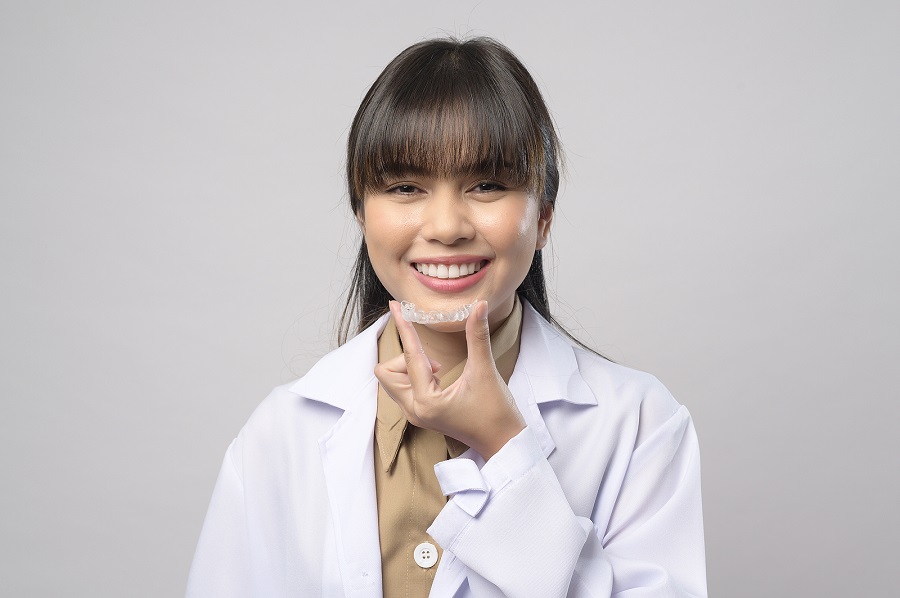Questions to Ask Your Invisalign Dentist Before Beginning Treatment
Posted by Phoenix Family Dentistry
Dental Procedure
on Dec 20 2017, 06:24 AM
Having crooked teeth or an improper bite can affect a person’s dental health and smile, but an Invisalign® dentist can help patients achieve a straighter smile for years to come. Before beginning, patients first have a consultation with a dentist in Phoenix, AZ to learn more about the process. Asking questions is important for allowing patients to feel confident going into the treatment.
Frequently asked questions regarding the Invisalign® treatment process
For patients considering Invisalign®, it can be daunting trying to decide if this is the right solution for their unique situation. Learn the answers to several common questions patients have about clear aligners.
Who is a good candidate for treatment?
Generally, Invisalign® is only recommended for older teens and adults who have the lifestyle and discipline to wear the aligners as instructed. While a good solution for many types of common alignment and bite issues, there are certain limits to what conditions this treatment option can complete. If interested, patients should consult with an Invisalign® dentist in 85053 who can examine the mouth and determine if the case can be addressed with aligners.
Are Invisalign® braces noticeable?
When comparing options for addressing misalignment of the teeth, Invisalign® is one of the most inconspicuous alternatives available to patients. Unlike traditional braces that most often require metal brackets and wires to be placed on the teeth with flashy rubber bands, clear aligners fit snugly over the patient’s teeth and are hardly noticeable when worn.
Are There Any Restrictions or Considerations During Treatment?
Ask about any dietary restrictions, oral hygiene instructions, or other considerations to keep in mind while undergoing Invisalign treatment.
What Happens if I Lose or Damage an Aligner?
Understand the protocol for handling lost or damaged aligners and whether replacements are available if needed. Call us to learn more.
Are there any eating restrictions?
One major advantage of Invisalign® is that patients can easily remove the aligners at any time, making any diet changes unnecessary. It is recommended to always take the trays out when consuming any food or beverage that is not water. Brushing and flossing the teeth after meals can help keep the trays from staining or getting sullied.
How successful is Invisalign®?
For people with treatable cases, clear aligners are often an effective means of adjusting the position of the teeth and jaw. However, the success of treatment relies heavily on how compliant the patient is with following the guidelines. Unlike regular braces that are fixed onto a person’s teeth at all times, it can be tempting to remove Invisalign® whenever the teeth are uncomfortable. Additionally, people may misplace the aligners or forget to put the trays back on after meals.
To achieve the desired results, patients must wear the aligners at least 22 hours a day. If this requirement is not met, it may take longer to complete the process or the treatment may be unsuccessful. Additionally, patients need to continue wearing a retainer at night to keep teeth from shifting once in the proper position.
Conclusion
Come to your initial appointment with an Invisalign® dentist prepared with questions you want to ask, including the inquiries explored in this guide and any others about the treatment process. A productive consultation appointment facilitates realistic expectations and allows patients to understand what is required for the teeth to successfully shift into the desired position.
By asking these questions and discussing your concerns with your Invisalign dentist, you can ensure that you have all the information you need to make informed decisions about your orthodontic treatment and achieve the best possible outcomes.
Request an appointment or call Phoenix Family Dentistry at 602-547-9007 for an appointment in our Phoenix office.
Share On

How Long Is Recovery From a Root Canal?
Having crooked teeth or an improper bite can affect a person’s dental health and smile, but an Invisalign® …

Can an Invisalign Dentist Correct Crooked Teeth?
Having crooked teeth or an improper bite can affect a person’s dental health and smile, but an Invisalign® …

Caring for Veneers After a Cosmetic Dentist Treatment
Having crooked teeth or an improper bite can affect a person’s dental health and smile, but an Invisalign® …





